This tour visits 3 diverse features east of Inverness:
You can extend this tour with a visit to Brodie Castle.
Suggested itinerary
After time at Culloden Battlefield we continue east and make a brief stop at the famed ‘Cumberland Stone'. Tradition claims that Augustus, Duke of Cumberland, surveyed the Battle of Culloden from this large glacial erratic, though modern historians are skeptical of this claim. We then descend into the floor of the Nairn valley and visit Clava Cairns.
Clava Cairns are the most important prehistoric site in the vicinity of Inverness, dating to the late neolithic or early bronze age. Your guide here points out many subtle features of these ancient burial mounds, overlooked by most casual visitors.
The ancient castle is fascinating both for its structure and contents.
We meet you at your accommodation and make the short drive south-east from Inverness to Culloden Battlefield, scene of the battle in April 1746 between the victorious forces of the government army supporting the incumbent Hanoverian king, and the Jacobites, supporting the restoration of the Stuart dynasty, under the leadership of Prince Charles Edward Stuart ('Bonnie Prince Charlie').
There is a visitor centre at the battlefield with an audio-visual presentation in 6 languages, + static displays. At the battlefield itself you should plan on at least 20 minutes, and preferably longer, to understand the disposition of the forces. So normally you should think of a minimum of an hour here, and maybe longer, depending on your level of interest.
There is no admission fee to the battlefield, cairn, graves of
the clans, shop, or café. Admission fee applies to rest of visitor centre; free to members of the National Trust of Scotland (click on this link to visit the Trust's site on Culloden) and all other participating National Trusts.
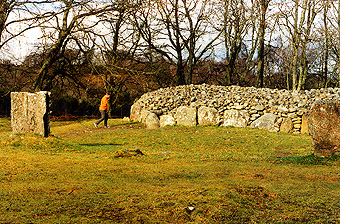
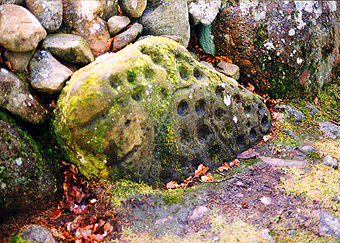
One of the Clava Cairns with part of its circles of standing stones; right, a cup-marked stone
We usually spend at least half-an-hour at this atmospheric site and then continue east to
Cawdor Castle which offers something for everyone.
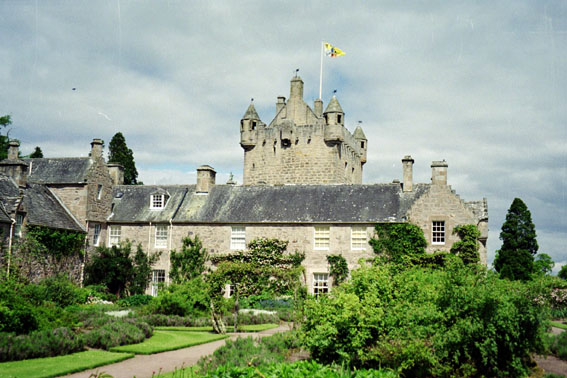
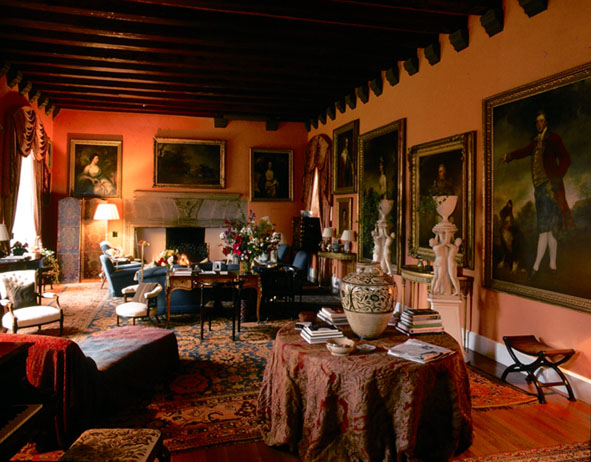
|
South of the castle is one of the largest oak woods in Britain and naturalists can find a wide variety of songbirds here. Red squirrel and roe deer are seen from time to time. There are beautiful woodland walks, from 5 furlongs to 5 miles Less energetic visitors may take pleasure in the Flower Garden or the secluded Paradise Garden. The latter includes the unusual solid bronze fountain on the right, made by Catalan sculptor Xavier Corbero. To visit the Cawdor Castle website, click here. |
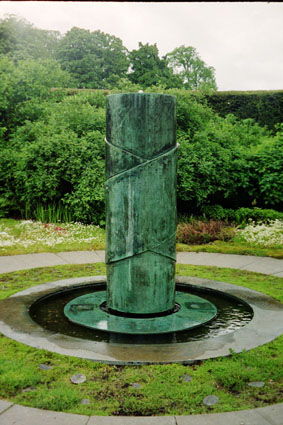
|
| There is a 1161-yard 9-hole golf course by the castle - par 32. £ 5 per round; £ 2 for club hire. The course usually takes about one-and-a-quarter hours. When you've finished the course, your ticket lets you into the castle restaurant where you may meet up with other members of your party who've been going through the castle. | 
|
Admission fees
Cawdor Castle. Full details of admission fees can be found at the Cawdor Castle website.
Cost of tour. It normally takes two-and-a-half hours from Inverness to Cawdor Castle with the stops at the battlefield and Clava Cairns. We suggest, for economy, that we leave you at the castle and that you return to Inverness by public transport. In this case the cost of the tour for 1-6 persons is £ 100.
If you wish us to wait for you at the castle then waiting time is £ 30/hour. You should think of a minimum of 1 hour at the castle, and longer if it is a fine day and you want to thoroughly enjoy the gardens.